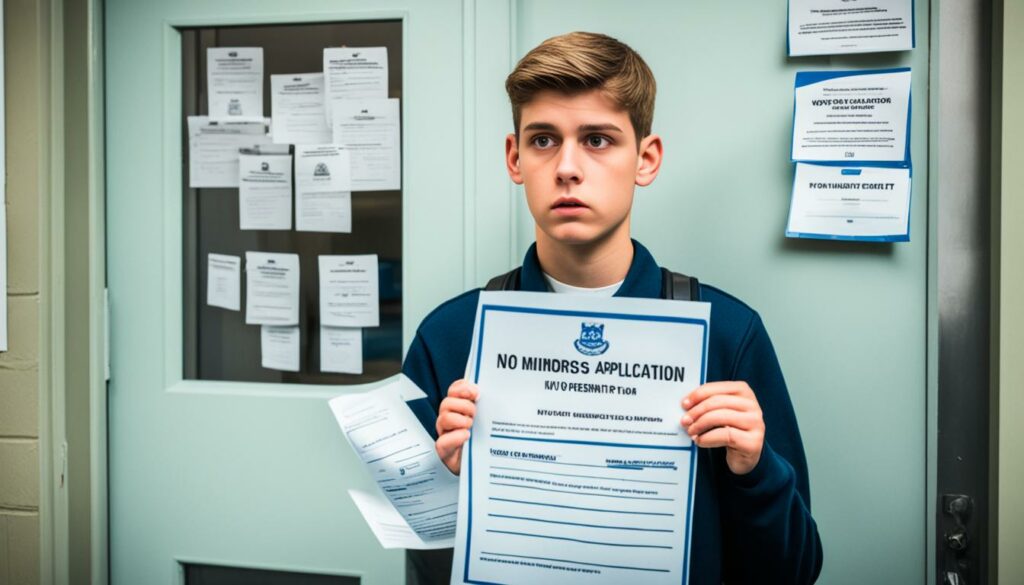Teens & Full-Time Work: What Are the Rules?
Are you a teenager wondering if you can work full time? Are you a parent curious about the legal working age for teenagers? Understanding the rules and regulations surrounding teenage full-time employment is crucial. In this article, we will explore the guidelines set by the Fair Labor Standards Act (FLSA) and state laws to provide you with the information you need.
Key Takeaways:
- Teenagers can work full time, but there are specific rules and regulations to follow.
- The minimum age for employment is 14 years old according to the FLSA.
- Each state also has its own laws regarding teenage employment, with the stricter law taking precedence.
- Minors under 14 years old have limitations on the types of jobs they can work, but there are still opportunities available.
- Teen employees must be paid at least the federal minimum wage, which is $7.25 per hour.
Now that you have an overview, let’s dive deeper into the regulations surrounding teenage full-time work and the opportunities available for different age groups. Keep reading to find out more!
Minimum Age Standards for Nonagricultural Employment

When it comes to nonagricultural employment, child labor laws play a crucial role in ensuring the well-being and protection of young workers. In the United States, the Fair Labor Standards Act (FLSA) sets the minimum age for nonagricultural employment at 14 years old. However, there are specific rules and exceptions that vary depending on the age of the minor and the type of job they are applying for.
The FLSA takes into account the potential hazards and risks associated with different occupations. To safeguard the welfare of young workers, the FLSA prohibits employment in hazardous work, which is determined by the Secretary of Labor. These hazardous occupations include tasks that involve operating heavy machinery, working with dangerous chemicals, or exposure to extreme temperatures or heights.
It is important for employers to adhere to these age standards and follow the guidelines set by the FLSA. By doing so, they help protect young individuals from engaging in work that may be physically or mentally harmful to their development. Compliance with child labor laws ensures a safe and responsible working environment for minors.
“The FLSA sets important safeguards to protect young workers and establish age-appropriate employment standards. It’s essential for employers to understand and comply with these regulations to ensure the well-being and safety of young employees.” – [Industry Expert]
To further comprehend the minimum age standards for nonagricultural employment, a comprehensive table is provided below:
| Age Group | Allowed Work | Restricted Work |
|---|---|---|
| 14-15 Years Old |
|
|
| 16-18 Years Old | All nonagricultural jobs (excluding hazardous work) |
|
Understanding the minimum age standards for nonagricultural employment is essential for both employers and young individuals seeking employment. Compliance with these standards ensures that minors are protected from potentially harmful work environments while still allowing them to gain valuable experience and develop essential skills.
Workable Jobs for Minors Under 14

Minors under 14 years old have limited options when it comes to non-agricultural jobs. However, there are still opportunities for them to gain valuable skills and experience. The Fair Labor Standards Act (FLSA) defines certain workable jobs that are suitable for minors under the age of 14. These jobs are non-hazardous and allow minors to contribute to their communities while learning important lessons about responsibility and teamwork.
Newspaper Delivery
One popular job for minors under 14 is newspaper delivery. They can work as paperboys or papergirls, delivering newspapers to customers in their neighborhood. This job not only teaches them the importance of timely delivery and customer service but also helps them develop a sense of responsibility and discipline.
Babysitting
Babysitting is another suitable job for minors under 14. They can provide childcare services for local families, helping parents with their young children. This job enables minors to enhance their nurturing skills, develop patience, and demonstrate their ability to handle responsibility in a caring environment.
Acting or Performing
If minors are interested in the performing arts, they can explore opportunities in acting or performing. School plays, local theater productions, and community events often provide platforms for young aspiring actors and performers. Engaging in such activities allows minors to express their creativity, boost their self-confidence, and develop their communication and stage presence skills.
Homeworker
Minors under 14 can also work as homeworkers. This includes tasks such as making crafts, assembling products, or packaging items. These jobs can be done from home or in a small workshop environment. Working as a homeworker enables minors to learn about entrepreneurship, time management, and the importance of producing quality work.
Parent-Owned Business
Another option for minors under 14 is to work in a business owned by their parents. This is permissible as long as the occupation is not hazardous, according to the FLSA guidelines. It allows minors to learn about different aspects of running a business and gain exposure to the professional world at an early age.
To better understand the scope of the workable jobs available for minors under 14, refer to the table below.
| Job Title | Description |
|---|---|
| Newspaper Delivery | Delivering newspapers to customers in the neighborhood |
| Babysitting | Providing childcare services for local families |
| Acting or Performing | Participating in school plays, local theater productions, or community events |
| Homeworker | Completing tasks such as crafts, product assembly, or packaging |
| Parent-Owned Business | Working in a business owned by their parents |
Remember, while minors under 14 have limitations on the jobs they can work, these opportunities still provide valuable learning experiences. It is important to prioritize the safety and well-being of minors while ensuring they have a positive and educational work environment.
Workable Jobs for Minors 14-15 years old

Minors aged 14-15 have the opportunity to work in various non-agricultural employment sectors, although there are specific limits on their work hours and job responsibilities. Here are some of the workable job options available for teens in this age range:
- Retail Occupations: This includes positions such as cashier, sales associate, or stockroom assistant in retail stores.
- Creative or Intellectual Work: Teens can engage in jobs related to art, writing, computer programming, or other creative pursuits.
- Delivery Work: Opportunities exist for minors to work as delivery persons for newspapers, local flyers, or small packages.
- Yard Work without Electric Equipment: Teens can take on tasks like mowing lawns, raking leaves, or gardening, as long as they don’t operate electric machinery.
- Kitchen and Food Service Work: Minors can work in restaurants or cafes, assisting with food preparation, serving, or cleaning.
- Jobs Involving Cars and Trucks: Teens can perform tasks related to car wash services, gas stations, or other vehicle-related jobs, as long as they don’t engage in driving or operating heavy machinery.
It’s important to note that minors aged 14-15 have specific restrictions on the number of hours they can work per day and per week. The exact limitations may vary depending on state laws and regulations, so it’s essential for both employers and teens to familiarize themselves with the specific guidelines in their location.
To provide a clearer perspective, the table below outlines the maximum number of hours minors aged 14-15 can work under the Fair Labor Standards Act:
| Age | Maximum Hours per Day | Maximum Hours per Week |
|---|---|---|
| 14-15 | 3 hours on school days 8 hours on non-school days |
18 hours per week during school weeks 40 hours per week during non-school weeks |
Example Quote:
“As a 14-year-old, I was able to work as a cashier part-time at a local grocery store. It was a great way to learn about customer service and develop my communication skills while earning some extra money.” – Emily Wilson, former teenage employee.
As teens gain valuable work experience in non-agricultural employment roles, they also develop important life skills, time management abilities, and a sense of responsibility. Furthermore, these jobs can empower young individuals with financial independence and a sense of achievement.
Workable Jobs for Minors 16-18 years old

When minors reach the age of 16-18, they have more flexibility and opportunities in the job market. They are eligible for a wide range of non-agricultural employment options, as long as the job does not fall under the hazardous occupation list determined by the Secretary of Labor. This age group also enjoys the benefit of being able to work an unlimited number of hours per week.
As teenagers explore their options, they can consider various fields and roles that align with their interests and goals. Here are some examples of workable jobs for minors aged 16-18:
- Retail positions: Minors can work in retail stores, gaining valuable customer service and sales skills.
- Office or administrative work: Teens can take up roles such as clerical assistants, helping with data entry, document preparation, and general office tasks.
- Food service industry: Opportunities include working as servers, hosts/hostesses, or kitchen assistants in cafes and restaurants.
- Tutoring or mentoring: Teenagers with expertise in specific subjects can offer their services as tutors or mentors to younger students.
- Customer service: Minors can work in roles that involve assisting customers, whether in-person, over the phone, or online.
These are just a few examples, and there are many other workable jobs available to minors aged 16-18. It’s essential for teenagers and their parents to research and understand the specific requirements and regulations related to their desired employment opportunities.
Expert Insight:
“Teenagers aged 16-18 often have a great opportunity to gain valuable work experience and develop important skills that will benefit them later in life. Encouraging their interests and helping them explore different industries can set them on the path to future success.”
– Jane Smith, Career Advisor
Having guidelines in place helps ensure that minors can work in a safe and appropriate environment. The next section will explore the pay and wage requirements for teen employees, providing key insights into how they can receive fair compensation for their work.
Pay and Wage Requirements for Teen Employees
When it comes to paying teen employees, there are certain wage requirements that employers must meet to ensure fair compensation. Let’s take a closer look at the minimum wage for teen employees and the various payment methods that can be used.
First and foremost, it’s important to note that teen employees must be paid at least the federal minimum wage, which is currently set at $7.25 per hour. This ensures that they receive fair and equitable compensation for their work. However, it’s crucial to be aware that some states have higher minimum wages, and as an employer, you must adhere to the higher rate if applicable.
Employers have the flexibility to pay teen employees using different methods, depending on the nature of the job and the agreement between the employer and employee. These payment methods may include hourly wages, piece rates, daily rates, salaries, or a combination thereof.
Employers can pay teen employees on an hourly basis, where they receive a predetermined rate for every hour worked. This is the most common payment method and provides a straightforward approach to compensation.
Another method is piece-rate payment, where employees receive a set amount for each item they produce or task they complete. This method is often used in industries where work is measured in terms of productivity.
Some jobs may be paid on a daily rate basis, where employees receive a fixed amount for each day worked. This can be advantageous for positions that do not fit into standard hourly or piece-rate structures.
In certain cases, teen employees may be offered a salary, which provides a fixed amount of pay over a specific period, such as monthly or annually. However, it’s crucial to ensure that the average rate calculated from the salary meets or exceeds the minimum wage requirements.
Combining payment methods is also an option, where different rates are applied depending on the type of work performed. This approach can provide flexibility and fairness in compensating teen employees.
Employers should keep in mind that while they have the freedom to choose the most suitable payment method, it is essential to ensure that the average rate earned by teen employees always complies with the minimum wage requirements set by federal and state laws.
Comparison of Payment Methods for Teen Employees
| Payment Method | Description |
|---|---|
| Hourly Wages | Teen employees are paid a predetermined rate for every hour worked. |
| Piece Rates | Teen employees receive a set amount for each item produced or task completed. |
| Daily Rates | Teen employees receive a fixed amount for each day worked. |
| Salaries | Teen employees receive a fixed amount of pay over a specific period, such as monthly or annually. |
| Combined Methods | Employers may choose to combine different payment methods based on the type of work performed. |
As an employer of teen employees, it is crucial to understand and comply with the wage requirements set by federal and state laws. By ensuring fair compensation, you contribute to a positive working environment and help young individuals gain valuable experience in the workforce.
Exceptions and Overtime for Teen Employees
While the Fair Labor Standards Act (FLSA) sets regulations for teen employment, there are certain exceptions and rules regarding minimum wage and overtime pay for young workers.
Exceptions for Teen Employees
One exception to the minimum wage requirements is the provision for lower wages during the first consecutive 90 days of employment for employees under 20 years old. This allows employers to pay a subminimum wage to young workers who are just starting out in the workforce.
“The provision for lower wages during the initial 90 days of employment enables employers to provide training and learning opportunities to young workers,” explains Jennifer Williams, Director of Human Resources at XYZ Corporation. “It helps them gain valuable skills and experience while also allowing employers the flexibility to invest in their training.”
Overtime for Minors
Under the FLSA, overtime pay is not required for agricultural workers under the age of 18. This means that if a minor works more than 40 hours in a workweek in an agricultural job, there is no legal obligation for the employer to pay overtime wages for those extra hours.
However, it is important for employers to consult the Department of Labor Wage and Hour Office or seek professional guidance to understand the specific requirements and exemptions related to teen employees.
In conclusion, while there are exceptions to minimum wage requirements for teen employees, such as a lower wage during the first 90 days of employment, employers must still adhere to FLSA regulations and consult the appropriate authorities to ensure compliance with overtime pay and other labor standards.
| Minimum Wage Exceptions | Overtime for Minors |
|---|---|
| Subminimum wage during the first 90 days of employment for employees under 20 years old | No requirement for overtime pay for agricultural workers under the age of 18 |
Posting Requirements and Additional Resources
Employers who hire minor workers have certain posting requirements to comply with the Fair Labor Standards Act (FLSA) regulations. One of these requirements is to prominently display the FLSA Minimum Wage Poster in the workplace. This poster provides valuable information regarding minimum age requirements for teen employment.
Posting the FLSA Minimum Wage Poster ensures that both employers and employees are aware of the laws and regulations surrounding teen employment. By providing this visible reminder, employers help create a safe and fair work environment for young workers.
Additional Resources
In addition to the posting requirements, there are numerous resources available for employers and teen employees to learn more about labor laws and regulations. These resources cover state-specific laws as well as information on federal regulations.
“Knowledge is power. Equip yourself with the information you need to understand and comply with labor laws for teenage employees.”
Here are some valuable resources:
- The U.S. Department of Labor’s YouthRules! website (https://www.youthrules.gov/)
- Your state’s department of labor website
- Legal counsel specializing in labor law
By utilizing these resources, employers can ensure they are providing a safe and compliant work environment for teen employees. Employees can also educate themselves on their rights and responsibilities in the workplace.
| Resource | Description |
|---|---|
| YouthRules! website | An official website of the U.S. Department of Labor that provides information on youth employment rules, including regulations specific to different age groups. |
| Your state’s department of labor website | Each state has its own labor laws and regulations regarding teen employment. State websites provide specific information on these laws. |
| Legal counsel specializing in labor law | Employers can seek legal advice from professionals who specialize in labor law to ensure compliance with relevant regulations. |
Conclusion
Teenagers seeking full-time employment should familiarize themselves with the regulations established by the Fair Labor Standards Act (FLSA) and their state laws. While there are restrictions concerning the types of jobs and hours they can work, pursuing full-time work can provide young individuals with invaluable experience and numerous opportunities for personal and professional growth.
It is crucial for employers to fully comprehend and adhere to these laws to safeguard the well-being and safety of teenage employees. By understanding the limitations and abiding by the established regulations, employers can ensure a positive and secure working environment for young workers.
Teenagers who engage in full-time work may benefit from gaining practical skills, building a solid work ethic, and developing a strong sense of responsibility. Moreover, they can acquire financial independence, learn valuable time management skills, and better understand the dynamics of the professional world. Full-time employment offers a platform for teens to hone their abilities, explore various career paths, and set themselves up for future success.
FAQ
Can teenagers work full-time?
Yes, teenagers can work full-time depending on their age and the specific regulations set by the Fair Labor Standards Act (FLSA) and state laws.
What is the legal working age for teenagers?
The minimum age for employment in the United States is 14 years old, as set by the FLSA. However, there are limitations on the types of jobs and hours they can work depending on their age.
What are the workable jobs for minors under 14?
Minors under 14 years old can work in jobs such as newspaper delivery, babysitting, acting or performing, and working as a homeworker. They can also work in a business owned by their parents, as long as it is not a hazardous occupation listed by the FLSA.
What are the workable jobs for minors aged 14-15?
Minors aged 14-15 can work in retail occupations, creative or intellectual work, delivery work, yard work without electric equipment, kitchen and food service work, and some jobs involving cars and trucks. However, they have restrictions on the number of hours they can work per day and per week.
What are the workable jobs for minors aged 16-18?
Minors aged 16-18 can work in any non-agricultural job, as long as it is not declared hazardous by the Secretary of Labor. This age group can work an unlimited number of hours per week.
What is the minimum wage for teen employees?
Teen employees must be paid at least the federal minimum wage, which is $7.25 per hour. Some states have a higher minimum wage, which employers must adhere to.
Are there exceptions to minimum wage requirements for teen employees?
Yes, there are certain exceptions to minimum wage requirements for teen employees. For example, there may be a lower wage for the first consecutive 90 days of employment for employees under 20 years old. Employers should consult the Department of Labor Wage and Hour Office for specific requirements and exemptions.
Are there overtime requirements for teen employees?
Overtime pay for hours worked over 40 in a workweek is not required for agricultural workers. However, for non-agricultural workers, employers should consult the FLSA regulations regarding overtime requirements for teen employees.
What are the posting requirements for employers with minor workers?
Employers with minor workers are required to post the FLSA Minimum Wage Poster, which lists minimum age requirements and other important information. This poster should be displayed in a conspicuous place where all employees can easily see it.
Where can I find additional resources on labor laws for minors?
There are numerous resources available to learn more about labor laws for minors. You can consult state-specific laws and information on federal regulations on the Department of Labor website or contact your local Department of Labor office for guidance.






